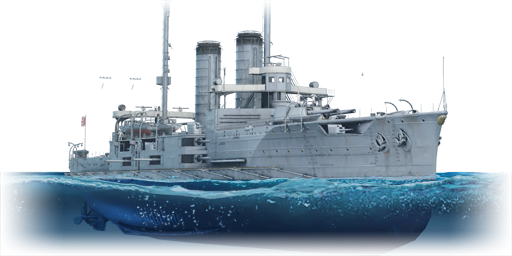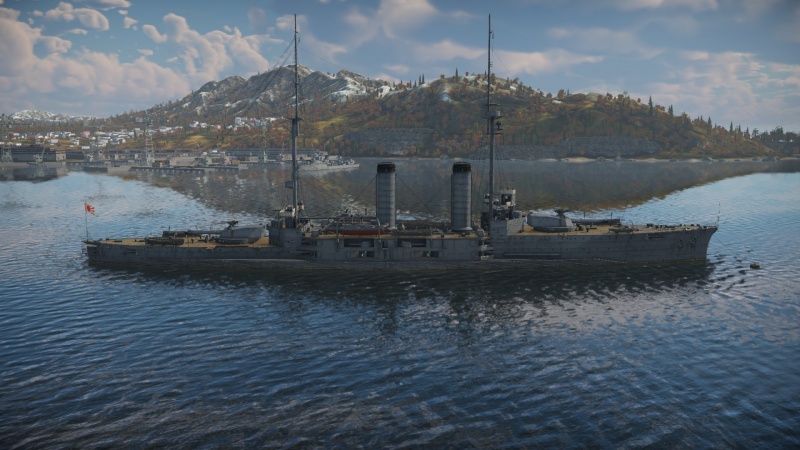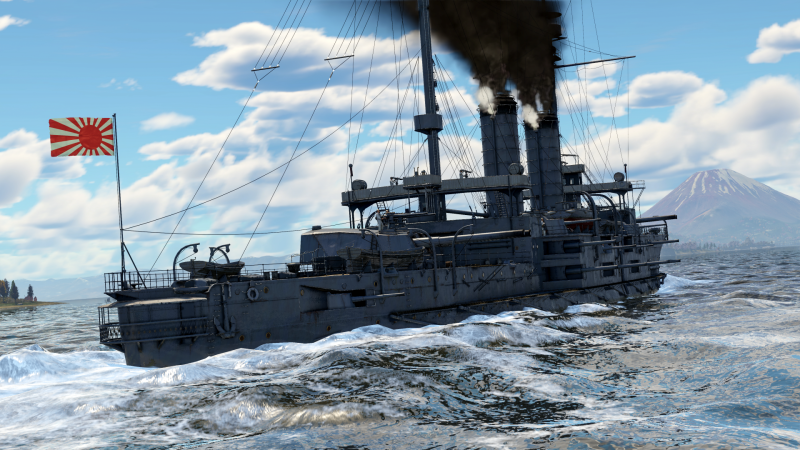IJN Ikoma
Contents
Description
The Tsukuba-class, IJN Ikoma, 1912 (生駒, namesake: Mount Ikoma) was the second ship of the Tsukuba-class armoured cruisers. Laid down in 1905 and commissioned in 1908 to replace the loss of battleships Yashima and Hatsuse during the Russo-Japanese war, Ikoma and her sister ship Tsukuba were the first capital ships to be designed and built entirely in Japan, albeit with the use of some imported weaponry and components. Due to the urgency of her construction, the Tsukuba-class were plagued with hull strength and stability problems, as well as numerous mechanical difficulties throughout their careers.
Shortly after her commissioning, Ikoma was sent to escort the American "Great White Fleet" on its round-the-world voyage. Ikoma herself would later complete circumnavigation around the world on her own in 1910. After being redesignated as a "battlecruiser" in 1912, Ikoma would go on to serve in World War I, being assigned to protect Allied shipping from German commerce raiders. Ikoma's wartime career was rather uneventful, however, and she would later be scrapped in 1923 in accordance with the Washington Naval Treaty.
Introduced in Update "New Power", the Ikoma is a peculiar ship, being a representative of an "armoured cruiser" design: a heavily-armed ship with guns of numerous calibres and a speed just fast enough to outrun most battleships of its era. Although the Japanese categorized the ship as a battlecruiser, it is anything but. The ship is slow and lacks any firepower compared to true battlecruisers of her era (such as the HMS Invincible or the SMS Von der Tann). However, being an armoured cruiser isn't entirely bad for the Ikoma, as the ship is smaller yet much more armoured than most WW2 cruisers, as well as packing heavy firepower capable of destroying those who underestimate her.
General info
Survivability and armour
The Ikoma has a typical armour scheme for an armoured cruiser of its era - thick armour protecting the vitals - a waterline belt of 178 mm of rolled cemented (face hardened) armour in the middle of the ship, and a 127 mm thick rolled cemented citadel above that protecting the casemated 6" guns, which themselves have 152 mm rolled cemented gunshields. The corners of the citadel are also 152 mm rolled cemented.
The main turrets and barbettes under them are 178 mm of rolled cemented, with 25 mm rolled homogeneous roofs. The 4.7" guns have 80 mm rolled cemented gunshields.
The waterline fore and aft of the main belt has a thinner belt of 102 mm cemented, conning towers are 203 mm rolled cemented at the front, and 152 mm at the rear, with 38 mm rolled homogeneous roofs.
There are 3 decks of 38 mm rolled homogeneous armour - the top 2 are horizontal, the bottom one has a "step" in it allowing a higher headroom in the engine rooms.
The 2 magazines are each fully enclosed by 38 mm rolled homogeneous plate. Lastly there are 25 mm rolled homogeneous bulkheads covering the gap between the 2 main barbettes and the citadel fore and aft. Coal bunkers line the unarmoured sides of the engine rooms.
By the standards of later times it is a complicated scheme, however it gives comprehensive protection against 6-8" guns of WW2 era cruisers. The crew is 884 men, which is quite substantial, and they are well protected.
Mobility
The ship is extremely slow, and not very manoeuvrable. Acceleration and deceleration rates are not good, and it takes a considerable time to start turning.
| Mobility Characteristics | |||
|---|---|---|---|
| Game Mode | Upgrade Status | Maximum Speed (km/h) | |
| Forward | Reverse | ||
| AB | |||
| Upgraded | 47 | 25 | |
| RB/SB | |||
| Upgraded | 41 | 22 | |
Modifications and economy
After researching Tool Kit and Fire Protection System, mobility upgrade should be your first priority as the stock Ikoma's speed and agility is severely lacking. Then you can either improve her gunnery or survivability. The AP shell for both the main and secondary guns can be left until all other modifications were researched due to their ineffectiveness.
Armament
Primary armament
The Ikoma features four 12-inch (305 mm) Vickers cannons as the main armament, mounted in a dual setup at the bow and stern each. The turrets have a rather poor traverse speed and handling, but with good protection.
Being large calibre guns, the Ikoma's shell choice is also considerably powerful for her battle rating. The default HE shell has ~38 kg of TNT equivalent filler. While the shell is relatively weak for its calibre, it is enough to cripple most enemy cruisers it hits. The researchable APC shell features high penetration at close range (345 mm at 5 km) but will lose its velocity at longer ranges, reducing its penetration power (to 229 mm at 10 km - on par with heavy cruisers with 203 mm guns) in the process. Due to this, the Ikoma will struggle against any capital ship it may have to face in uptiers.
As a pre-Great War design, the 305 mm gun's characteristics aren't exactly the best either, with a long reload time of 30 seconds (ace crew) and a mediocre dispersion radius.
| Penetration statistics | |||||||
|---|---|---|---|---|---|---|---|
| Ammunition | Type of warhead |
Penetration @ 0° Angle of Attack (mm) | |||||
| 1,000 m | 2,500 m | 5,000 m | 7,500 m | 10,000 m | 15,000 m | ||
| 12-inch/45 HE | HE | 69 | 69 | 69 | 69 | 69 | 69 |
| 12-inch/45 APC | APC | 496 | 432 | 345 | 278 | 229 | 172 |
| Shell details | ||||||||||||
|---|---|---|---|---|---|---|---|---|---|---|---|---|
| Ammunition | Type of warhead |
Velocity (m/s) |
Projectile mass (kg) |
Fuse delay (s) |
Fuse sensitivity (mm) |
Explosive mass (TNT equivalent) (kg) |
Ricochet | |||||
| 0% | 50% | 100% | ||||||||||
| 12-inch/45 HE | HE | 825 | 400.06 | 0 | 0.1 | 37.82 | 79° | 80° | 81° | |||
| 12-inch/45 APC | APC | 825 | 400.06 | 0.035 | 17 | 13.64 | 48° | 63° | 71° | |||
Secondary armament
The Ikoma has twelve 6-inch (152 mm) Type 41 cannons and twelve 4.7-inch (120 mm) Armstrong cannons as her secondary armaments. Being an armoured cruiser, six of these guns are distributed on the sponsons on each side of the ship, thus allowing up to twelve guns to be fired from the broadsides. Due to the quantity of the guns, the Ikoma can deal a considerable amount of additional damage to enemy cruisers and destroyers alike while the main gun is reloading.
The 152 mm guns have two shell choices; a default HE shell with surprisingly high filler of 5.28 kg of TNT equivalent, and a researchable APC shell with poor penetration of only 74 mm at 10 km. Thus, it is advised to only uses the HE shell instead.
Being such an antiquated guns does not come without downsides, however. Both guns suffer from the same downsides as the main guns; poor reload time of 12 seconds (ace crew), and having slow traverse and dispersion radius.
| Penetration statistics | |||||||
|---|---|---|---|---|---|---|---|
| Ammunition | Type of warhead |
Penetration @ 0° Angle of Attack (mm) | |||||
| 1,000 m | 2,500 m | 5,000 m | 7,500 m | 10,000 m | 15,000 m | ||
| 6-inch HE | HE | 43 | 43 | 43 | 43 | 43 | 43 |
| 6-inch APC | APC | 194 | 163 | 123 | 94 | 74 | 58 |
| Shell details | ||||||||||||
|---|---|---|---|---|---|---|---|---|---|---|---|---|
| Ammunition | Type of warhead |
Velocity (m/s) |
Projectile mass (kg) |
Fuse delay (s) |
Fuse sensitivity (mm) |
Explosive mass (TNT equivalent) (kg) |
Ricochet | |||||
| 0% | 50% | 100% | ||||||||||
| 6-inch HE | HE | 825 | 45.3 | 0 | 0.1 | 5.28 | 79° | 80° | 81° | |||
| 6-inch APC | APC | 825 | 45.3 | 0.01 | 7 | 1.88 | 48° | 63° | 71° | |||
Anti-aircraft armament
The "anti-air" armament of the Ikoma consists of four 3-inch (76 mm) Type 41 flak cannons, with a pair mounted on top of each of the main turrets.
These guns are effectively useless due to them being placed so close together, thus restricting the coverage to just the front of the turret facing, requiring the player to "aim" the guns with their slow main turrets at the aircraft to even get it onto target at the first place. Worse still, the guns have a very poor elevation of just 30 degrees upwards, rendering the ship defenseless against dive bombers.
To rub more salt into the wound, the guns only have a time-fuse shell with a tiny amount of explosive filler as their shell of choice, essentially dealing little to no damage to enemy aircraft. When combined with the slow-firing secondaries, this will also makes the Ikoma highly vulnerable against any fast PT boats that can effectively sneak past the defense and deal catastrophic damage with torpedoes.
Additional armament
The 21 inch Type 43 (1910) torpedo is a good weapon by the standards of 1910 when it was introduced. It carries a 130 kg Shimose warhead (143kg TNT equivalent) to a range of 8 km at 50 km/h. The warhead is small by later standards, and not likely to knock out a destroyer with one hit, let alone anything larger.
The Ikoma carries 2 fixed tubes - 1 facing to each broadside, and 17 reloads. The fixed tubes are located under the forward main turret, and are difficult to use since they are aimed by manoeuvring the ship - which is not easy to do as already noted.
The limitations are such that not carrying any torpedoes is a good choice - the SL you save is greater than any reward you might get.
Usage in battles
The Ikoma is classed as a "battlecruiser" in War Thunder, probably because it was designated a battlecruiser by the Japanese from 1912. However it is too slow and unmanoeuvrable to be used as a "fast battleship" as battlecruisers are often considered.
It is better to consider it as the armoured cruiser it was designed as. There is no real modern counterpart to "armoured cruiser", so it is probably simplest to think of it as a slow heavy cruiser. In some respects it is comparable to the Deutschland-class "Panzerschiff" (e.g. the Admiral Graf Spee), especially in terms of the main armament being a small number of heavy guns. It can be played in a similar manner - mostly trying to "camp" somewhere protected from torpedoes and using the small number of heavy guns to score damaging hits on easy targets.
The slow rate of fire and small number of the main guns make them difficult to use against fast moving manoeuvring targets - they are best used against large targets that lack manoeuvrability such as heavy cruisers or larger. Light cruisers, destroyers, and smaller vessels can be attacked by controlling the secondary 6" and 4.7" guns - there are 6 of each on each broadside and they can make short work of smaller ships or boats.
It is often impossible to dodge torpedoes due to the sluggish manoeuvrability, so using islands as a shield from torpedoes is recommended where they are available.
There is no effective AA armament, and aircraft can easily come down to mast height to accurately deliver bombs, rockets or torpedoes. You can only hope the rest of your team has enough AA to provide some protection. The 3 armoured decks can absorb a lot of punishment from smaller bombs, but any armour piercing bombs, or anything from 1,000 lb/500 kg upwards will cause significant damage. At this BR, heavier bombs such as 1,800 kg, 4,000 lb and 5,000 kg are common loads, and can destroy the ship with 1 or 2 hits.
Pros and cons
Pros:
- Powerful 12" main armament can wreck anything less than a battleship with a few hits
- Heavy secondary armament of 6" and 4.7" guns is sufficient to take out cruisers and destroyers
- Short profile, can be somewhat difficult to hit at longer ranges
- Heavy armour absorbs most damage from enemy guns and small-medium bombs
Cons:
- Abysmal top speed and mobility; very slow to turn or accelerate/decelerate - makes dodging torpedoes difficult
- Only 4 of the 12" guns with a very slow rate of fire (30 second when maxed)
- Secondary armaments have long reload time (12 second when maxed), further limiting the damage output
- Poor dispersion on both the main and secondary armaments, makes accurate shooting difficult against moving targets
- Effectively useless AA armaments, extremely vulnerable to any aircrafts and PT boats
History
The Ikoma was the 2nd of the 2-ship Tsukuba class of armoured cruisers built by Japan. They were ordered as a result of the loss of 2 pre-dreadnought battleships to mines early in the Russo-Japanese War of 1904-1905, and were fairly standard armoured cruisers of the era, although their 12" gun main armament was heavier than others of that type. The design was rushed, and the class suffered from numerous defects during their service.
The Ikoma was laid down in March 1905, launched in April 1906, and commissioned in March 1908.
During WW1 it took part in the Japanese assault on Tsingtao in China, then escorted allied convoys in the south-west Pacific, being based in Hong Kong, Singapore and Townsville, Australia.
After the war it was scrapped to meet obligations of the Washington Naval Treaty, and removed from the navy list in September 1923.
Media
- Skins
See also
Links to articles on the War Thunder Wiki that you think will be useful for the reader, for example:
- reference to the series of the ship;
- links to approximate analogues of other nations and research trees.
External links
Paste links to sources and external resources, such as:
- topic on the official game forum;
- other literature.
| Kure Naval Arsenal (呉海軍工廠) | |
|---|---|
| Heavy Cruisers (CA) | |
| Mogami-class | IJN Mogami* |
| Battlecruisers (BC) | |
| Tsukuba-class | IJN Ikoma |
| Battleships (BB) | |
| Kawachi-class | IJN Settsu |
| Fusō-class | IJN Fuso |
| Note | *Initially built as a CL with 15.5 cm cannons, refitted with 20.3 cm and reclassified as a CA |
| Japan battlecruisers | |
|---|---|
| Tsukuba-class | IJN Ikoma |
| Kurama-class | IJN Kurama |
| Amagi-class | IJN Amagi |






